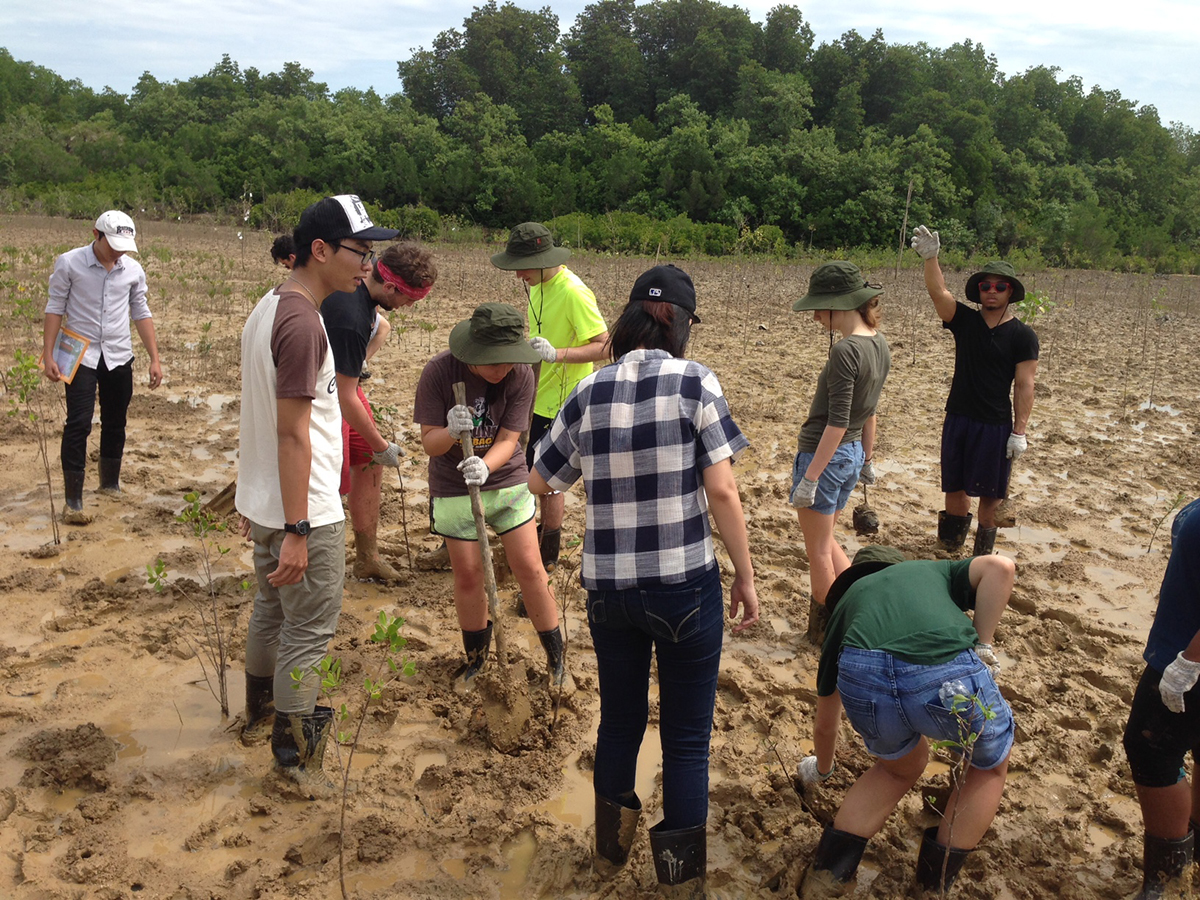Climate change in Vietnam spurs students to speak up
By Melanie Cordova

Ten Cornell students spent two weeks of their winter break on a journey through Vietnam, listening to farmers and community members, and seeing the effects of climate change firsthand.
The trip was part of an interdisciplinary course, “Climate Change Awareness and Service Learning in the Mekong Delta,” led by Michael Hoffmann and Thúy Tranviet. In the fall, the students took classes that introduced them to global climate change and Vietnamese language, culture and history.
From Jan. 3-18 the group traveled throughout the Mekong Delta, attending lectures from experts at Can Tho and Ton Duc Thang universities, and engaging in service learning activities in the local communities.
Vietnam, with more than 2,000 miles of coastline, is a major exporter of fish and shrimp, valued at about $7 billion per year. The country is also the second-largest producer of coffee and one of the top exporters of rice in the world.
“Vietnam grows much of its own food but is also an important agricultural exporter,” said Hoffmann, the executive director of the Cornell Institute for Climate Smart Solutions and professor of entomology in the College of Agriculture and Life Sciences. “The Vietnamese are resilient, but climate change will be a real test.”
The Mekong Delta, where 17 million people live, is one of the most at-risk areas in the world from climate change, Hoffmann said. Farmers in the region depend on a stable environment to cultivate crops at 5 feet above sea level. Salt water intrusion, due in part to sea level rise, is already affecting agriculture in the region, as Marc Alessi ’18 saw firsthand.
“Last year, Vietnamese farmers suffered the worst drought ever recorded,” Alessi said. “In one commune, 100 percent of their rice crop was destroyed due to salt intrusion and drought.”

Tranviet, senior lecturer in the Department of Asian Studies in the College of Arts and Sciences and a 2016 Engaged Faculty Fellow, said, “The purpose of the course is not just to tell the story of climate change, but to put a face to it, of the people who are directly impacted by it. The service-learning activities are crucial in providing the students opportunities to engage with the communities to have a more meaningful experience.”
For Jeff Fralick ’18, the trip was a chance to talk directly to people already experiencing the consequences of a changing climate. The environmental science and sustainability major said Vietnamese farmers would rarely have an opportunity to come to the U.S. to share their experience, and he felt it was important to give a voice for their concerns.
“In Vietnam, the sea levels are rising,” he said. “There are droughts. The rains are increasing and fall at different times than they did in the past. It’s important to come back and tell that story.”
Both instructors will team up again this semester for the third component of the course. This spring, the class is holding weekly meetings where the students reflect and report on the trip, give presentations, develop media outreach and complete final projects. Plans are also in the works to visit Washington, D.C., where students will share the facts about climate change and the impacts it is already having.
Climate change can be a charged topic for some in the U.S. So says Kerry Mullins ’18, a student in the course: “I know that for most Americans, climate change is not on their list of top concerns.”
That is, if it’s on their list at all. “We have people here who don’t even think it exists,” said Alessi.
It’s why part of this spring’s portion of the course is focused on outreach and communication about what the students learned. It’s an effort that started with blog posts the students wrote while in Vietnam. Hoffmann said they’ll be looking for “any and all ways to tell the story.”
Students like Stevanica Augustine ’19 and Gail Fletcher ‘17 know that a story focused on people will be more effective in communicating the experience of the farmers in the Mekong Delta. “I want to make climate change as personal as possible,” Augustine said.
“Statistics can only illustrate so much,” Fletcher said, “and have a limit to how much change they can incite.”
Melanie Cordova is communications coordinator for the College of Agriculture and Life Sciences.
Media Contact
Get Cornell news delivered right to your inbox.
Subscribe